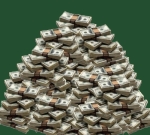 Whether people like it or not, it is a fact that the production of valuable things requires more than physical labor. (I’m looking at you, Karl Marx, with your Labor Theory of Value and “profit as exploitation.”) This is especially true when it comes to industrial-scale mass production. To successfully deliver products at a reasonable price and quality, a company must be organized in certain ways that are effective; there must be communication and coordination between the various departments; there must be management to make sure things keep running smoothly together and that timetables are kept; there must be wealth invested for buildings, machinery and raw materials in the right amounts; any machinery and facilities must be continually maintained; there must be management of sales and distribution of the product; etc.
Whether people like it or not, it is a fact that the production of valuable things requires more than physical labor. (I’m looking at you, Karl Marx, with your Labor Theory of Value and “profit as exploitation.”) This is especially true when it comes to industrial-scale mass production. To successfully deliver products at a reasonable price and quality, a company must be organized in certain ways that are effective; there must be communication and coordination between the various departments; there must be management to make sure things keep running smoothly together and that timetables are kept; there must be wealth invested for buildings, machinery and raw materials in the right amounts; any machinery and facilities must be continually maintained; there must be management of sales and distribution of the product; etc.
A collection of factory workers without power tools, without specific roles and without management direction will produce very little and very inefficiently. In any line of business, there is a tremendous amount of strategy, business planning, technical planning, management, and industry knowledge that goes into making a company productive and successful.
As I discussed in my essay, “How Business Executives and Investors Create Wealth and Earn Large Incomes,” a company’s chief executive officer (CEO) carries tremendous responsibility: he is crucial in making large-scale decisions for the company, implementing and coordinating major changes, planning long-term for the future market and technology the company will face, formulating and holding onto a large-scale vision of where the company should go, etc.


